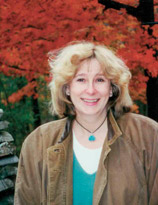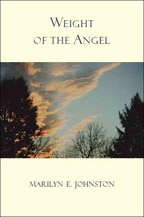|
|
|
|
||||
Early readers of Weight of the Angel have been enthusiastic. Gray Jacobik comments as follows: “‘The heart suppressed / only deepens,’ the poet writes in Weight of the Angel, the latest collection of poems from Marilyn Johnston. And oh my, but how generously that deep heart opens in poems so real they lose their status as made objects and become coterminous with being. What lingers in these luminous, transparent poems, is the music captured in lines such as these: ‘Remorseless, she’s swept every table bare of violets, / some thrown out in full bloom, like violence / heaped on violence that has taken all she loves...’ I imagine it’s taken Johnston ‘all she loves’ to have written these heartbreaking and memorable poems. Read them at risk: they may deepen your heart.” And this from Dick Allen: “Marilyn E. Johnston’s new collection is a tribute to family, particularly to the lives of women, and by extension to the lives of all women. Reading Johnston’s poems, we are often in the place of her college self: ‘Stunned, / frightened, exhilarated, almost panicked / to be confided in.’ The poems are filled with abundant love and forgiveness, and they are written with meticulous precision. In her title poem, Johnston has vowed, ‘We will not loosen our fierce grip / on the indifferent past’ and by using small dramas, utterly specific imagery and description, her gifted and gifting eye, expert touches of indirection and perfect closures, she renders the past unforgettable. Weight of the Angel is a book of such close-seeing and pitch it compels us into understanding how we, also—in our imaginations and realities—may simultaneously trap and set free those we love.” Marilyn E. Johnston was born and raised in Hartford in a lineage of Connecticut Irish farmers on her mother’s side and Illinois Finnish immigrants on her father’s. Recipient of an MA in English from Trinity College, for many years she pursued a career in insurance communications, a career she abandoned in order to concentrate on the writing of poetry. In the past decade, her work has received five Pushcart Prize nominations and has appeared in numerous literary journals including The Worcester Review, Atlanta Review, South Carolina Review, and Poet Lore. Her chapbook Against Disappearance was published as finalist for the 2001 Redgreene Press Poetry Prize, and her first full-length collection, Silk Fist Songs, appeared in 2008. Commitments to poetry and to community have led her to work in the Bloomfield Public Library, where she directs a poetry series presenting Connecticut writers to an ever-expanding audience. With her husband, Ray, Marilyn Johnston lives on an old farm in Bloomfield, Connecticut.
See below for sample poems by Marilyn Johnston For another book by Marilyn Johnston, see Silk Fist Songs. Click here for a televied appearance on SCTV. Click here to view Marilyn Johnston’s upcoming events Click here to read Marilyn Johnston's ancillary material in the Seminar Room |
||||
|
BOOK STATISTICS ISBN 978-0-9823970-1-5 Copyright ©2009
|
|
THE CORNFLOWER BLUE DRESS The first grade photo—oval face, |
|
THE CIGARETTE Back from college, second year, sure |
|
MAKING THE NEWS “Come On!” Mother yells at our girls Thick scrub of forsythia deftly |
| TWO EAGLES AND HORSE BOOKSHOP
How has Mother come to know |
| VIOLETS
Showing them off: On the table by the picture window: thick, I enter the condo, five months since he died. |
| HER BONICA ROSE
We are struggling to transfer a rose bush |

